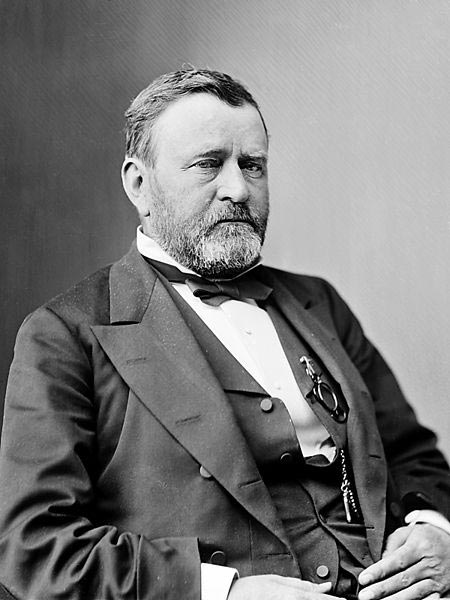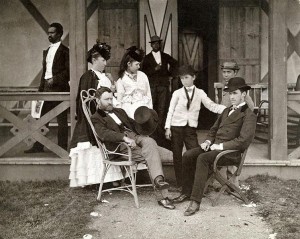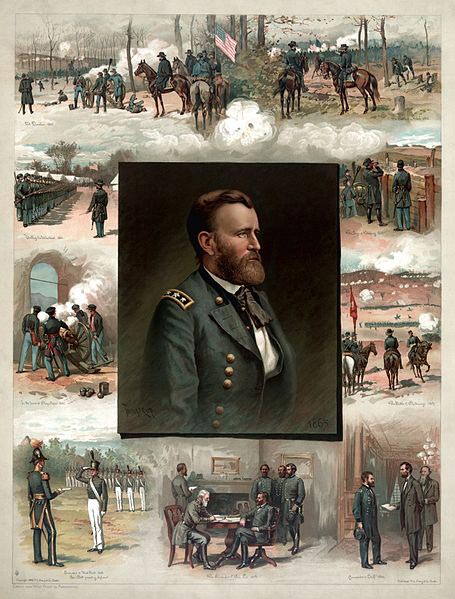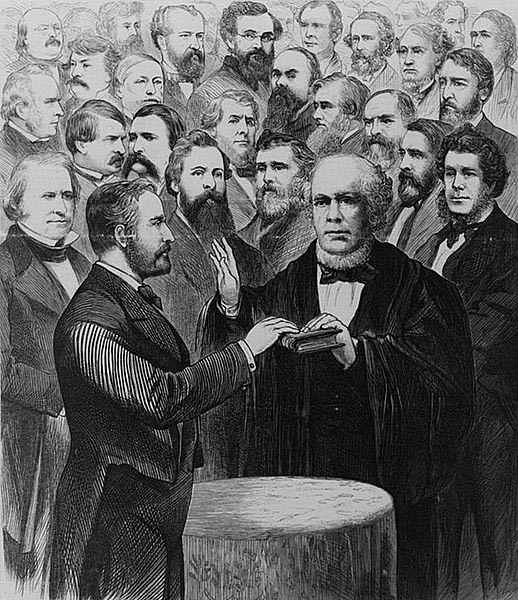| Ulysses S. Grant | |
|---|---|
 |
|
| 18th United States President « Previous Next » |
|
| In office | Mar. 4, 1869 – Mar. 4, 1877 |
| V. President | Schuyler Colfax, Henry Wilson |
| Political Party | Republican |
| Personal Info | |
| Born | Apr. 27, 1822 |
| Died | July 23, 1885 (at age 63) |
| Religion | Methodism |
| School | United States Military Academy |
| Profession | Soldier |
| Signature | |
| Wife | Julia Dent |
| Children | Jesse Root Grant, Ulysses S. Grant, Jr., Nellie Grant, Frederick Dent Grant |
| U.S. Presidents 16-25 | |
| 16. Abraham Lincoln (1861–1865) | |
| 17. Andrew Jackson (1865-1869) | |
| 18. Ulysses S. Grant (1869-1877) | |
| 19. Rutherford B. Hayes (1877-1881) | |
| 20. James A. Garfield (1881-1881) | |
| 21. Chester A. Arthur (1881-1885) | |
| 22. Grover Cleveland (1885-1889) | |
| 23. Benjamin Harrison (1889-1893) | |
| 24. Grover Cleveland (1893-1897) | |
| 25. William McKinley (1897-1901) | |
| List of All the Presidents |
Some interesting facts about Ulysses S. Grant, 18th U.S. President:
• He was ranked #3 on the list of United States Presidents by military ranking and was the 18th president of the United States after Andrew Johnson’s term.
• In 1858, he purchased a slave from his wife’s father which made him one of the 12 U.S presidents who owned slaves during their lifetime.
• He became the 17th Commanding General of the United States Army from March 9, 1864-March 4, 1869.
• He Commanded the 21st Illinois Infantry Regiment, the Army of the Tennessee, the Military Division of the Mississippi, and the Armies of the United States and the United States Army.
• He was part of the Mexican-American War, the Battle of Resaca de la Palma, Battle of Palo Alto, Battle of Monterrey, Battle of Veracruz, Battle of Molino del Rey, Battle of Chapultepec, American Civil War, Battle of Fort Donelson, Battle of Shiloh, Siege of Vicksburg, Battle of Chattanooga, Overland Campaign, Siege of Petersburg, and Appomattox Campaign.
• He was also the first president whoever signed a congressional Civil Rights Act of 1875, which commanded equal treatment in public accommodation and jury selection.
• He was the second president from Ohio and first to be re-elected in 1872.
The Early Life and Military Career of Ulysses S. Grant
Hiram Ulysses S. Grant grew up and was born on 27th of April 1822 in Point Pleasant Ohio. His father Jesse Grant (1794-1873) a tanner by profession and his mother Hannah Simpson Grant (1798-1883) were both natives of Pennsylvania. Their historical root can be traced back to Matthew Grant who came in Massachusetts Bay on 1630. During the collapse of 1823, their family moved in a village located in Georgetown in Brown Country Ohio. His family’s religion was Methodist. Grants family influence landed him a slot in USMA in New York at West Point.
Congressman Thomas L. Hamer nominated him and mistakenly wrote his name as Grant, Ulysses S. His friends at West point would simply call him “Sam” Although he graduated 21st out of 39 cadets in 1843. When he was 21 years old he was excellent in mathematics and could possibly have been an instructor had there been no Mexican war during that time. He had a fearless reputation and was a very skilled horseman. For 25 years his high jump record was unbeatable. On the 22nd of August 1848 he married Julia Boggs Dent (1826-1902), offspring of a slave holder. Their family grew with the addition of their children named, Jesse Grant, Ulysses S. Grant, Jr., Grant, Nellie, and Frederick Grant.
 He was an impressive soldier; his first duty after his graduation was Regimental Quartermaster, with a rank of lieutenant. He helped supervise supplies and equipment for the troops. Then he became a captain during the Mexican war (1846-1848) and won two citations for bravery and commendable conduct. After the war, he was appointed to boring and tedious duties in remote posts. He was away from his family this time and he began to neglect his duties and responsibilities and started drinking hard.
He was an impressive soldier; his first duty after his graduation was Regimental Quartermaster, with a rank of lieutenant. He helped supervise supplies and equipment for the troops. Then he became a captain during the Mexican war (1846-1848) and won two citations for bravery and commendable conduct. After the war, he was appointed to boring and tedious duties in remote posts. He was away from his family this time and he began to neglect his duties and responsibilities and started drinking hard.
In 1854 he resigned from being a soldier to avoid being dropped out from service due to his neglect of duty. He resigned at the age of 32, and he and his family struggled for 7 years 1854-1858. He tried to work in their farm close to Missouri, St. Louis using the slaves from his wife’s father; sadly it didn’t flourish. He then made an effort to work and became a collector of bills in St. Louis from 1858-1859. In 1860 after numerous unsuccessful business attempts, his father gave him a job as assistant in their tannery shop in Illinois at Galena. It was a leather store where they sold saddles, harnesses, purchased hides from farmers and other goods made of leather.
Ulysses S. Grant and the Civil War
 When Civil War began in 1861 he saw his chance to be a soldier again and volunteered for military service in the Union Army. His first role was to be the colonel of the 21st Infantry of Illinois, and because he was an excellent soldier he was promoted quickly. By July 1861, he was already Brigadier General and on September he was assigned to rule the region of Missouri in the Southeast area.
When Civil War began in 1861 he saw his chance to be a soldier again and volunteered for military service in the Union Army. His first role was to be the colonel of the 21st Infantry of Illinois, and because he was an excellent soldier he was promoted quickly. By July 1861, he was already Brigadier General and on September he was assigned to rule the region of Missouri in the Southeast area.
During that battle he showed his remarkable strategic approach. His main goal was to control the Mississippi valley, and on February 1862 he attacked Fort Donelson and Fort Henry, their opponent was on the verge of defeat when their enemies Confederate Commander asked Grant for terms but he just answered “No terms except an unconditional and urgent surrender can be accepted”, that replied made him known as the “unconditional surrender Grant”. His victory on July 4, 1863 against Confederate General John Pemberton’s army of 30,000 made his enemy to surrender at his might. He was known for his brilliant approaches, and this victory was one example.
He sent his General William T. Sherman and part of their army to capture the state capitol Jackson, while he and his remaining man set for Vicksburg to close their enemies supply base. President Lincoln soon received many pressure to remove Grants because of an unfortunate incident that happened when the Confederate forces ambushed Grants and his men which resulted in a large number of casualties. But, Lincoln refused the pressure and would not allow Grant to be removed.
Since then Grant and his men won many battles. On March 1864, President Lincoln made Grant Lieutenant General and bestowed the honor General in Chief of the Armies of the United States. Battles of Wilderness, Spotsylvania, Cold Harbor and Siege of Petersburg shattered the rebel army, although he only had half of his men left standing it was enough to make Robert E. Lee and their enemies’ army of Northern Virginia surrender on 1865. After the Civil War, and after President Lincoln’s assassination, President Andrew Johnson made him Secretary of War over the newly reunited Nation.
Life as President
 Soon after war, Ulysses S. Grant defeated Andrew Johnson for his second presidential election and he was voted as President of the United States for two consecutive terms from March 4, 1869 to March 4, 1877. His vice presidents were Schuyler Colfax (1869-1873) and Henry Wilson (1873-1875) and during 1875-1877 he had no vice president. As president, he brought and appointed much of his army personnel in Whitehouse. His administration was riddled with corruption and scandal incidents. Most of the time, he relied on Congress for instruction. Grant was an honest man, although from time to time he was fond of accepting lavish gifts from admirers and so called friends.
Soon after war, Ulysses S. Grant defeated Andrew Johnson for his second presidential election and he was voted as President of the United States for two consecutive terms from March 4, 1869 to March 4, 1877. His vice presidents were Schuyler Colfax (1869-1873) and Henry Wilson (1873-1875) and during 1875-1877 he had no vice president. As president, he brought and appointed much of his army personnel in Whitehouse. His administration was riddled with corruption and scandal incidents. Most of the time, he relied on Congress for instruction. Grant was an honest man, although from time to time he was fond of accepting lavish gifts from admirers and so called friends.
One of his mistakes was being acquainted with Jay Gould and James Fisk due to their treacherous plot to corner the market of gold. When Grant realized their bad intentions he directed the Secretary of treasury to sell enough gold in hopes on destroying their plans but it was already too late, the damage had been done. He allowed radical reconstruction to run the South. He was the first president to be elected after former president Andrew Johnson banned slavery. He then gave former African American slaves citizenship by amending the U.S Constitution. His presidency had to deal with the Ku Klux Klan, or KKK, that brought violence to colored people.
There were also the conflicts of Native Americans and Western settlers that were increasing during his time. His reign also had to deal with the famous Panic of 1873, due to the fueled wild rumor and corruption. Although there were many problems during his time, Grant was responsible for effective legislation. Grant’s “Innovative Peace Policy” promoted Native American Citizenship and condemned wars of extermination as immoral and wicked. But then he allowed millions of buffalo to be hunted non-stop without restrictions which eventually caused the depletion of Native American Food supply and of tribal independence.
Like the former president before him, he supported amnesty from former Confederates and even signed the Amnesty Act of 1872. He also signed the Naturalization Act of 1870 allowing persons of African descent to become citizens of the United States. He also enforced civil rights for African Americans, and singed treaty of Washington in 1871. Although his reputation suffered tremendously during his two term of presidency, he maintained his beliefs and honest ways. He did everything he could to promote peace and order and give everyone a fair chance. This belief was strongly evident when he signed bills in 1869 and 1871 promoting Black voting rights and persecuting Klan members by winning the passage of 15th amendment which gave freedom to vote. He continued to lobby for the rights of Native Americans to preserve their lands against intrusion of the Westward advance pioneers.
Life in Retirement
After his retirement from presidency he became a partner in a finance firm that unfortunately went bankrupt. And sadly, he also learned he had cancer of the throat. In debts and with serious illness, Ulysses S. Grant developed a strong will and motivation to support his family by becoming a writer. He wrote about his war experiences for Century Magazine. His books became popular, and so he wrote again about his autobiography entitled “Personal Memoirs of U. S. Grant” that earned $450,000.00. When he finished his the two volume set, he died few days after due to cancer at the age of sixty three at Mount McGregor, New York.